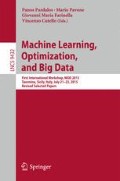Abstract
This paper introduces an adaptive framework that makes use of ensemble classification and self-training to maintain high classification performance in datasets affected by concept drift without the aid of external supervision to update the model of a classifier. The updating of the model of the framework is triggered by a mechanism that infers the presence of concept drift based on the analysis of the differences between the outputs of the different classifiers. In order to evaluate the performance of the proposed algorithm, comparisons were made with a set of unsupervised classification techniques and drift detection techniques. The results show that the framework is able to react more promptly to performance degradation than the existing methods and this leads to increased classification accuracy. In addition, the framework stores a smaller amount of instances with respect to a single-classifier approach.
The first author would like to thank the NCR corporation for sponsoring this project.
Access this chapter
Tax calculation will be finalised at checkout
Purchases are for personal use only
References
Aggarwal, C.C., Watson, T.J., Ctr, R., Han, J., Wang, J., Yu, P.S.: A framework for clustering evolving data streams. In: Proceedings of the Twenty-nineth International Conference on Very Large Data Bases, VLDB 2003, vol. 29, pp. 81–92. VLDB Endowment, Berlin (2003)
Basu, S., Banerjee, A., Mooney, R.J.: Semi-supervised clustering by seeding. In: Proceedings of the Nineteenth International Conference on Machine Learning, ICML 2002, pp. 27–34. Morgan Kaufmann Publishers Inc., San Francisco (2002)
Cao, F., Ester, M., Qian, W., Zhou, A.: Density-based clustering over an evolving data stream with noise. In: Proceedings of the Sixth SIAM International Conference on Data Mining, SDM 2006, pp. 328–339. SIAM (2006)
Dietterich, T.G.: Ensemble methods in machine learning. In: Kittler, J., Roli, F. (eds.) MCS 2000. LNCS, vol. 1857, pp. 1–15. Springer, Heidelberg (2000)
Ditzler, G., Polikar, R.: An ensemble based incremental learning framework for concept drift and class imbalance. In: The 2010 International Joint Conference on Neural Networks (IJCNN), pp. 1–8, July 2010
Dries, A., Rückert, U.: Adaptive concept drift detection. Stat. Anal. Data Min. 2(5–6), 311–327 (2009)
Friedman, J.H., Rafsky, L.C.: Multivariate generalizations of the Wald-Wolfowitz and Smirnov two-sample tests. Ann. Stat. 7, 697–717 (1979)
Gama, J., Žliobaitė, I., Bifet, A., Pechenizkiy, M., Bouchachia, A.: A survey on concept drift adaptation. ACM Comput. Surv. (CSUR) 46(4), 44 (2014)
Hido, S., Idé, T., Kashima, H., Kubo, H., Matsuzawa, H.: Unsupervised change analysis using supervised learning. In: Washio, T., Suzuki, E., Ting, K.M., Inokuchi, A. (eds.) PAKDD 2008. LNCS (LNAI), vol. 5012, pp. 148–159. Springer, Heidelberg (2008)
Gonçalves Jr., P.M., de Carvalho Santos, S.G., Barros, R.S., Vieira, D.C.: A comparative study on concept drift detectors. Expert Syst. Appl. 41(18), 8144–8156 (2014)
Li, P., Wu, X., Hu, X.: Mining recurring concept drifts with limited labeled streaming data. ACM Trans. Intell. Syst. Technol. 3(2), 29:1–29:32 (2012)
Nishida, K., Yamauchi, K., Omori, T.: ACE: Adaptive classifiers-ensemble system for concept-drifting environments. In: Oza, N.C., Polikar, R., Kittler, J., Roli, F. (eds.) MCS 2005. LNCS, vol. 3541, pp. 176–185. Springer, Heidelberg (2005)
Polikar, R.: Ensemble based systems in decision making. IEEE Circ. Syst. Mag. 6(3), 21–45 (2006)
Sahel, Z., Bouchachia, A., Gabrys, B., Rogers, P.: Adaptive mechanisms for classification problems with drifting data. In: Apolloni, B., Howlett, R.J., Jain, L. (eds.) KES 2007, Part II. LNCS (LNAI), vol. 4693, pp. 419–426. Springer, Heidelberg (2007)
Tsymbal, A.: The problem of concept drift: Definitions and related work. Technical report, Trinity College Dublin, Ireland (2004)
Vargha, A., Delaney, H.D.: A critique and improvement of the “CL” common language effect size statistics of McGraw and Wong. J. Educ. Behav. Stat. 25(2), 101–132 (2000)
Author information
Authors and Affiliations
Corresponding author
Editor information
Editors and Affiliations
Rights and permissions
Copyright information
© 2015 Springer International Publishing Switzerland
About this paper
Cite this paper
Conca, P., Timmis, J., de Lemos, R., Forrest, S., McCracken, H. (2015). An Adaptive Classification Framework for Unsupervised Model Updating in Nonstationary Environments. In: Pardalos, P., Pavone, M., Farinella, G., Cutello, V. (eds) Machine Learning, Optimization, and Big Data. MOD 2015. Lecture Notes in Computer Science(), vol 9432. Springer, Cham. https://doi.org/10.1007/978-3-319-27926-8_15
Download citation
DOI: https://doi.org/10.1007/978-3-319-27926-8_15
Published:
Publisher Name: Springer, Cham
Print ISBN: 978-3-319-27925-1
Online ISBN: 978-3-319-27926-8
eBook Packages: Computer ScienceComputer Science (R0)

